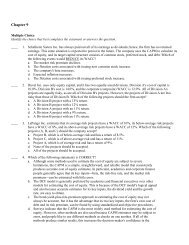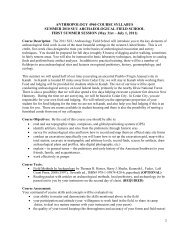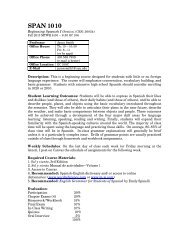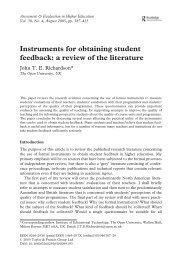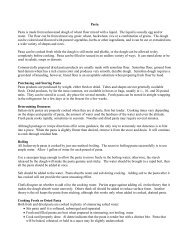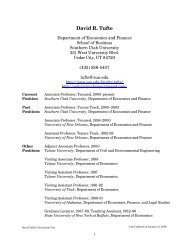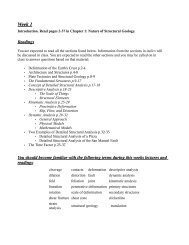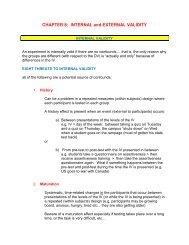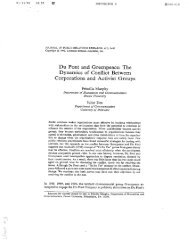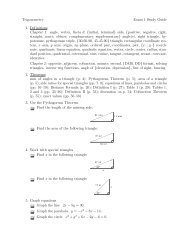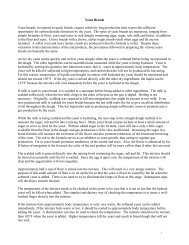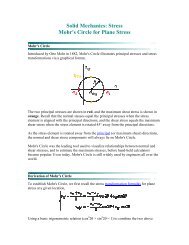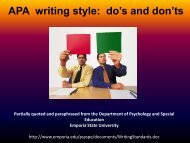Jeffrey Barnes: Self-Evident Truths - Southern Utah University
Jeffrey Barnes: Self-Evident Truths - Southern Utah University
Jeffrey Barnes: Self-Evident Truths - Southern Utah University
Create successful ePaper yourself
Turn your PDF publications into a flip-book with our unique Google optimized e-Paper software.
APPENDIX IV<br />
CULTURAL PREFERENCE/PRACTICE DIFFERENCES<br />
DON’T ELIMINATE THE UNIVERSALITY OF MORAL PRINCIPLES<br />
Some disciplines in academic arenas might require your acknowledging that cultural<br />
differences exist, which is true. However, some of the logical extensions of relativism<br />
are not reasonable, even absurd. The rhetoric goes, that if cultural norms, preferences,<br />
and practices are different, then universal morality is not provable. Some would posit<br />
that if no universal morality exists, then no universal “law-giver” exists. And if no<br />
universal law-giver exists, then God does not exist! Thus, relativism is the only rational<br />
explanation and universal moral objectivity is a canard. What is good (cultural practice<br />
A) for one culture is good and what is good (cultural practice B) for another culture is<br />
good, but neither practice A or B need be accepted as good by both cultures. In the<br />
Brothers Karamazov, Dostoevsky basically states that when man believes that God does<br />
not exist, all things are permissible. (Dostoevsky: pp. 50, 499, 549).<br />
Morality is all relative to societal norms and expectations. Thus, the mandate is that we<br />
recognize these cultural differences and respect them as all being equally valid. Well, I<br />
find this fallacious and dangerous. For instance, just because the Inuit Eskimo culture<br />
allows a brand of euthanasia and a Sudanese tribe throws its deformed infants into the<br />
river because the tribe believes that such infants belong to the hippopotamus, the god of<br />
the river, does not make euthanasia and infanticide right or moral. (Pojman: p. 37) These<br />
are just a cultural preference or practice and that cultural preferences/practice, even<br />
though accepted by a united culture, does not necessarily make it right or moral.<br />
Compartmentalizing the innate, intuitive notion of morality or what is right or “ought to<br />
be done” when studying any intellectual discipline can cause some confusion. The<br />
concern about moral "relativism" is that it leads to the habit of shallow thinking regarding<br />
certain actions as being either "right or wrong." Some enlightened “scholars” blithely<br />
separate their academic discipline from philosophy from ethics from natural law--the<br />
ridiculousness of "higher education."<br />
Rather than trying to find moral "harmony" that better explains human behavior, either<br />
personally, interpersonally, and even cross-culturally, some just see different cultural<br />
preferences or practices as ways people "feed and cloth" themselves. The deeper and<br />
more important understandings that are really required to be explored, that motivate you<br />
and me, or anyone else, to do right is discounted. Listing fallible, discordant, debilitating,<br />
harmful, life-shortening, hurtful evidences and trying to find a harmonizing theme of<br />
what could be wrong is just "setting up a straw-man argument." Facts and reason don't<br />
seem to matter in determining "right or wrong."<br />
This refusal to harmonize human existence and finding meaning within our minds and<br />
hearts for what right and wrong are is dangerous. It leads to thinking that nothing is<br />
wrong. Right and wrong truly do exist and those that ignore this reality are equally guilty<br />
as those who teach that right and wrong is only a matter of perception. The moral<br />
relativist cries that it all depends on cultural norms and not on any set of universal truths.<br />
Page 26 of 33



